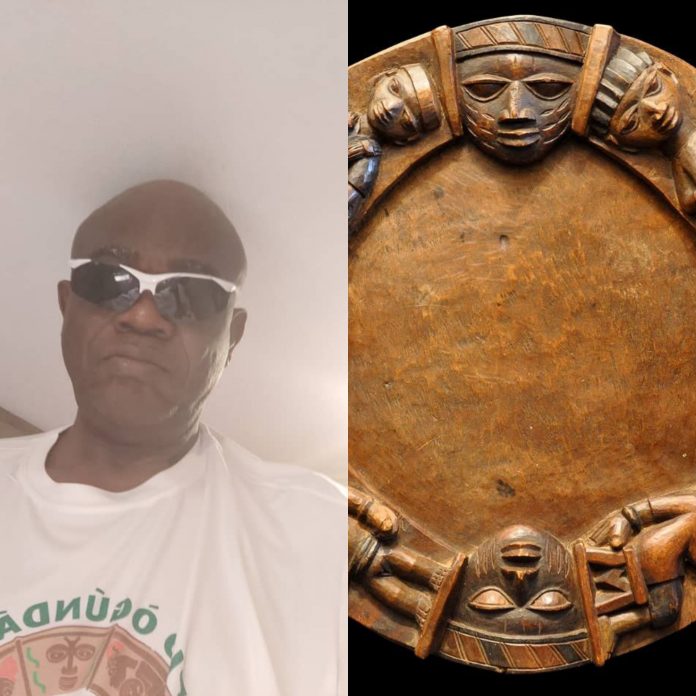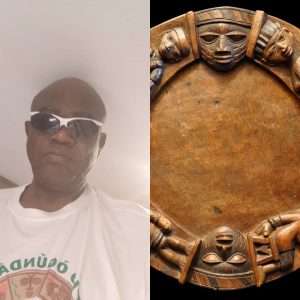Chief Solagbade and Ifa logo
By Adebayo Obajemu
One of the harmful effects of colonialism in Africa is the way African culture and traditions were rubbed off and supplanted with European culture.
Colonialism replaced African narratives about life, worldview, including religion and sense of being with European Christian God.
The result is the collosal loss of African identity, culture and African way of communing with the Supreme Being.
Western scholars, anthropologists and historians sought through their writings to portray everything African as barbaric, primitive and satanic, this narrative got hold of our imagination and psyche; and what followed was jettisoning of our tradition, and in the process, African religion and philosophy suffered.
Beginning from the 60s African scholars like professors Ade Ajayi, Kenneth Dike and others, not to talk of the contributions of African traditional religion scholars like John Mbiti.
The complexity of African traditional religion is as deep as the way the African view of communing with God is, but for thousands of years, Africans like most other peoples of the world have had a way of talking to and worshipping God.
In the Yoruba cosmology, Ifa religion constitutes the most potent way by which Yoruba people of western Nigeria interact spiritually with their creator.
Ifa is the essence of Yoruba religious life, it can be said to be the centre of everything in Yoruba land since its pronouncements have implications in all facet of life in the land of Oduduwa ( the progenitor of Yoruba race)
Every religion has its own avatar or avatars or, perhaps “wise one” who mediates and interpretes the symbols of that religion, Christianity has a lot of prophets, Islam has imams , in Ifa we have a few select Iyanifas.
Chief Solagbade popoola occupies a preeminent place in contemporary Ifa corpus.
Chief Popoola has been a founder or co-founder of a number of organizations, including Ifaworks and the International Council for Ifa Religion of which he is currently the President. He currently leads a network of Ifa temples in Nigeria, the United States, Mexico, Venezuela, Trinidad, and England. He is the author of numerous books and articles on various aspects of the Ifa tradition, including, most recently, Omoluabi
He is a leading Nigerian Ifa priest, but across the South America, he is widely known among Ifa devotees as Babalawo. He has over thirty years of knowledge and practice as a diviner and spiritual counselor, an interpreter of Odu stanzas, and a teacher of Ifa medicine, philosophy, and ethics.
As said early on Ifa in Yoruba rich cosmology is a religion and system of divination. Its literary corpus is the Odu Ifá. Orunmila is identified as the Grand Priest, as he is who revealed divinity and prophecy to the world. Babalawos or Iyanifas use either the divining chain known as Opele, or the sacred palm or kola nuts called Ikin, on the wooden divination tray called Opon Ifá.
Ifá is widely practised the Yoruba land throughout the Americas, West Africa, and the Canary Islands, in the form of a complex religious system, and plays a critical role in the traditions of Santería, Candomblé, Palo, Umbanda, Vodou, and other Afro-American faiths, as well as in some traditional African religions.
According to Yoruba religion, Ifa was founded by Orunmila in Ilé-Ifẹ̀ when he initiated himself and then he initiated his students, Akoda and Aseda. Other myths suggest that it was brought to Ilé-Ifẹ̀ by Setiu, a Nupe man who settled in Ilé-Ifẹ̀. According to the book The History of the Yorubas from the Earliest of Times to the British Protectorate (1921) by Nigerian historian Samuel Johnson and Obadiah Johnson, it was Arugba, the mother of Onibogi, the 8th Alaafin of Oyo who introduced Oyo to Ifá in the late 1400s.
She initiated the Alado of Ato and conferred on him the rites to initiate others. The Alado, in turn, initiated the priests of Oyo and that was how Ifá came to be in the Oyo empire. Odinani suggests that Dahomey Kings noted that the system of Afá was brought by a diviner known as Gogo from the Yoruba town of Ketu in eastern Benin.[2]
Orunmila came to establish an oral literary corpus incorporating stories and experiences of priests and their clients along with the results. This odu corpus emerges as the leading documentation on the Ifá tradition to become a historical legacy.
In Yorubaland, divination gives priests unreserved access to the teachings of Orunmila. Eshu is the one said to lend ashe to the oracle during provision of direction and or clarification of counsel. Eshu is also the one that holds the keys to one’s ire (fortune or blessing) and thus acts as Oluwinni (one’s Creditor): he can grant ire or remove it.
Ifá divination rites provide an avenue of communication to the spiritual realm and the intent of one’s destiny.
In Igboland, Ifá is known as Afá, and is performed by specialists called Dibia. The Dibia is considered a doctor and specializes in the use of herbs for healing and transformation.
Among the Ewe people of southern Togo and southeast Ghana, Ifá is also known as Afá, where the Vodun spirits come through and speak. In many of their Egbes, it is Alaundje who is honored as the first Bokono to have been taught how to divine the destiny of humans using the holy system of Afá. The Amengansi are the living oracles who are higher than a bokono. A priest who is not a bokono is known as Hounan, similar to Houngan, a male priest in Haitian Vodou, a derivative religion of Vodun, the religion of the Ewe
Apart from being a Babalawo, Chief Popoola also holds a Bachelors (BS) in Sociology and Anthropology (Second Class Upper Division) 1980. He later garnered a Masters Degree in the above subject areas as well, 1982, receiving his bachelors and masters degrees while attending school at The University of Ile Ife, Nigeria.
He then went on to receive a Diploma in Modern Management, 1989 while attending school at Ahmadu Bello University, Zaria.
Chief Popoola was also one of the Founders of Orunmila Youngsters International (Oyin) 1980’s. This institute was created to spread the teachings, philosophy, and morals of Ifa throughout the world. In 2004, this institute was transformed into the International Ifa Training Institute (IITI) and currently has chapters in Nigeria, USA, Mexico, Venezuela, Trinidad, England, and Colombia.
He was also was the editor in chief of “Orunmila” magazine which started in 1985 and continues to be the editor in chief of the new version of the magazine “Eleri Ipin” which is the official magazine of the International Council for Ifa Religion. Chief Popoola also holds the title of Chairman of Ethics and Scripture within the International Council for Ifa Religion.
Among the great books on Ifa he authored include:
*Practical Ifa Divination: Ifa Reference Manual Vol. 3 For the Beginner and Professional, July 1997.
*Ikunle Abiyamo: The Ase of Motherhood, Feb 2008.
*Ifa Dida: Volume 1 Eji-Ogbe to Ofun-Meji, June 2008.
*Ifa Dida: Volume 2 Ogbe Oyeku to Ogbe Ofun, June 2012.


